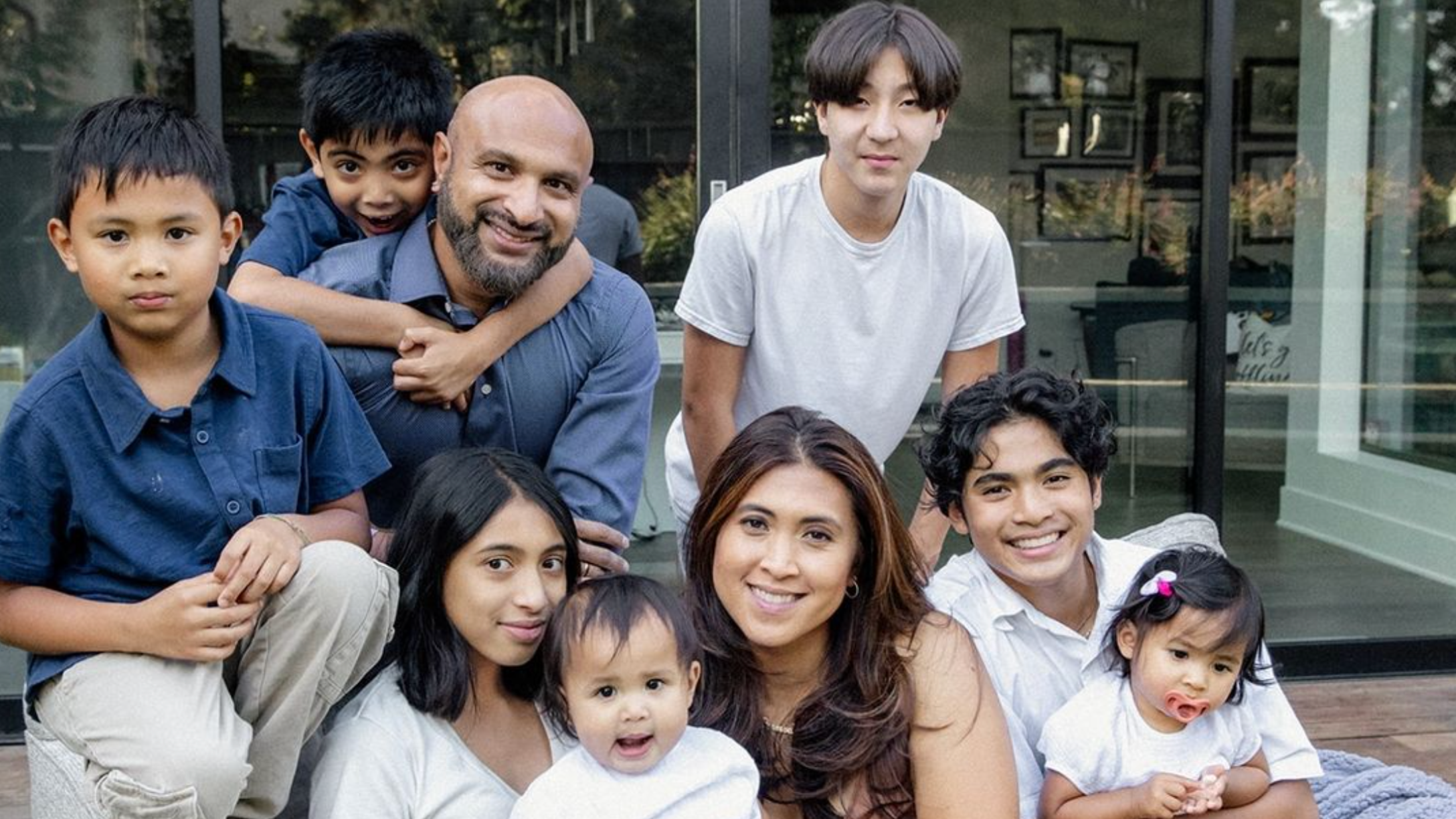
Certified life and mindfulness coach, Josephine Atluri, has a family portrait that looks like the starting lineup of a soccer team. With seven children, she has an unusually large family by today’s standards. But her journey to motherhood has been hard-fought, complete with devastating losses, honest conversations, and the eventual happy ending we see today.
October is Pregnancy and Infant Loss Awareness Month. In honor of Josephine’s story and the story of 1 in every 4 women, we're discussing her personal journey through loss and healing, in the hopes of being an inspiration to millions of other women like her.
Josephine and her husband knew with their specific medical history that they would likely need assistance conceiving. So over 20 years ago, they began their in vitro fertilization cycles. The couple went through back-to-back IVF treatments for three years before they were able to conceive.
Then they received good news, they finally had a successful pregnancy. Josephine was carrying twins. Then, at 17 weeks, in her second trimester, she lost the babies. Doctors were unable to determine the reason for the loss.
There was a period of darkness.
“Those first several months after, I call it a dark period in my life,” Josephine tells CafeMom. “I was grieving the loss of the twins. I didn’t really feel like doing much. For those months, it was about allowing feelings to come and go and sitting with them.” It’s advice she extends to her clients who are dealing with a similar pain: Feel the feelings.
Before the loss, Josephine and her husband had been doing IVF cycles with no break in between. “I never gave myself the opportunity to pause and reevaluate my situation, reevaluate if it was feasible to keep doing this from a mental, emotional standpoint,” Josephine says.
In the depths of her depression, friends and family tried their best to be supportive. But their methods weren’t always what Josephine needed at the time. Josephine and her husband’s friends and family lived out of state and many flew in to visit her after the loss of their twins.
“All I wanted was just to be alone,” Josephine explains. “It was very thoughtful of everyone to try to be there to support me but I just — It almost can feel like this is another thing I have to do to take care of other people when all I really need to do right now is take care of myself.”
When you’re grieving the loss of a child you lost in the womb, it can be hard for others to understand the severity of the loss. “[This is] someone only you had that connection with because you were the one who carrying the child. It’s hard for people to really grasp,” Josephine explains.
Eventually, Josephine experienced a turning point.
What was helpful, were the people who expressed that they were there for her, to listen to her vent, with no strings attached. “A reassuring thing someone said to me at the time was that I did not need to worry about them and that I should just process and do whatever I needed to do. And that they were just there. And not prodding me like, ‘How can I help you? What can I do?'"
The miscarriage and the subsequent time alone gave her time to pause and reevaluate. Josephine asked herself if she was mentally and emotionally capable of continuing on with the journey of carrying a child. Grief is not linear, and Josephine would experience many ups and downs. But eventually she did reach a breaking point.
“What I remember is I was in my room. I just wanted it to be dark, full-on depression. But every morning, no matter how dark I made the room, there would be some light coming in through the shades, around the edges,” Josephine explains. “And one day I just thought, no matter what I try to do, it’s still trying to come through. And it kind of hit me, maybe it’s time for me to let something else come through.”
Josephine realized she was exhausted existing in the throes of grief. While she knew that she needed that time to sit with her emotions, she knew the sitting was no longer helpful.
The pause helped Josephine gain clarity.
Josephine started asking herself some tough questions. “Can we do this again? Am I able to try for another pregnancy?,” Josephine asked herself. “The painful truth was that I wasn’t. So that’s how we pivoted to international adoption.”
And she eventually had to communicate those answers to her husband. One of the often unspoken aspects of pregnancy and infant loss is the toll it can take on romantic partnerships. Josephine and her husband enrolled in individual and group therapy after the loss of their twins.
“All of those moments really reminded us of the importance of communication, no matter how painful it is,” Josephine says. “Admitting certain things to your partner — for example, telling your partner, 'I just don’t want to try being pregnant anymore.' That’s a hard thing. So just trusting that the other person loves you and supports you. And you have that same feeling for them. Opening up the lines of communication really helped us through such a terrible moment.”
Her decision to adopt didn't immediately heal all of her wounds.
While the pathway to parenthood was looking more hopeful, Josephine found that the adoption process made her bitter.
“It was really difficult to do it after a pregnancy loss. I was really bitter about having to do certain things. I felt like I had already proven myself to be a fit mother, to want a child. And then to go through all these things as if I was applying for university or a job. I needed to get letters of recommendation. I had to fill out forms. We had to take a parenting class. No one has to do that if they just get pregnant," she says. "Here I was, just having gone through a second trimester loss, and then having to take this class. I just felt bitter. There were lots of other feelings that came up with it. Grieving is not linear.”
Ultimately, it was all worth it. Josephine and her husband took a baby home when he was 10 months old.
“We were finally a family.”
One child turned into seven.
For a year, everything was perfect. But with the addition of their son, Josephine and her husband had a renewed sense of hope in trying IVF once again. The process worked, and after a rough pregnancy that included bed rest and a procedure to delay labor, Josephine gave birth to twins.
Many years later, Josephine and her husband decided to pursue surrogacy. The result was seven children. Seven wasn’t exactly the goal. But both Josephine and her husband grew up with large extended families. It was something she wanted to recreate.
“My family immigrated from the Philippines and [my husband’s] from India back in the 70s and 80s,” Josephine says. “You grew up around your whole extended family. That was the culture. I was used to having a huge family. When I reflect back on the happiest moments in my life growing up, it was when I was with my extended family. So I wanted to replicate that for myself. But again, it wasn’t like we had a number 7 in mind. That’s a little crazy.”
Josephine encourages women not to lose themselves trying to have a child.
For women who may find themselves in the position Josephine was in, experiencing and moving through the pain of a loss, she suggests you don’t lose yourself in the process of having a child.
“My biggest piece of advice was back to that point I made about taking that pause. So often we feel like there’s this ticking time clock. We feel like we’re on borrowed time because of the age of our eggs. So it doesn’t feel like we have the opportunity to pause, to take a break. But I would argue and I advocate for the fact that even if you can give yourself a day or an hour where that’s not your life. It’s all-consuming. All of a sudden you don’t remember who you were outside of trying to conceive. Give yourself a moment where you can be you and still maintain that connection.”
Josephine remembers recognizing that she had become someone else entirely. “I didn't remember who I was,” Josephine admits. “There was a sad moment of realization where I was like who was I before all of this happened?. It was a scary moment to think that I just gave up on whoever I was and just traded it off to become this person who is just trying to conceive.”
She says the break or the pause can act as a form of encouragement. “That can really boost you up and uplift you for that next time that you try. That renewed sense of life that you get from doing that is a big factor in having that energy and the hope to try again. Because you’re not stuck in this hamster wheel. You took that breath that you needed to rejuvenate yourself.”
It's important to continue the conversation about pregnancy and infant loss.
No matter where you are in process of grief and mourning the loss of a child, Josephine reminds women to recognize that we all process things differently and there’s no right or wrong way to navigate this.
“For some women, it’s helpful to talk about it all the time to that they don’t forget. So that their children don’t get lost. And then for others, they don’t think that their children get lost because they remember them privately in their own way.”
Josephine encourages all of us to continue the conversations about pregnancy and infant loss because there are people you know who have stories to tell.
“Unless we’re talking about it out loud, we don’t know what they’re carrying,” Josephine says.. “It is so common. One in four women experience miscarriage or pregnancy loss. It’s amazing what happens when you open up the conversation. The moment you start talking about it with other people, you’re like oh my goodness. It just floors you. It actually is one in four. So many friends and family have experienced this but I didn’t know because we didn’t talk about it. It didn’t feel like something we could talk about.”




